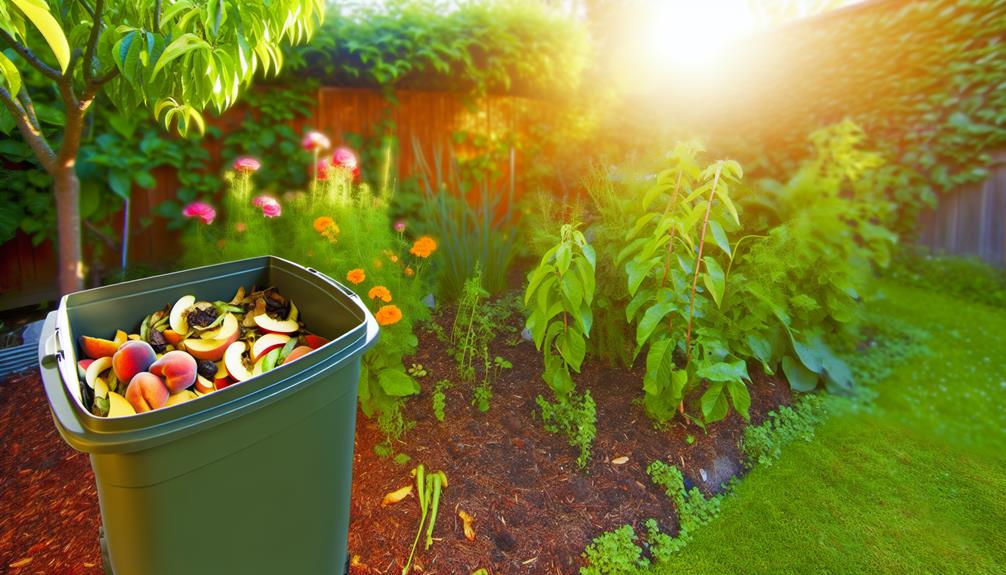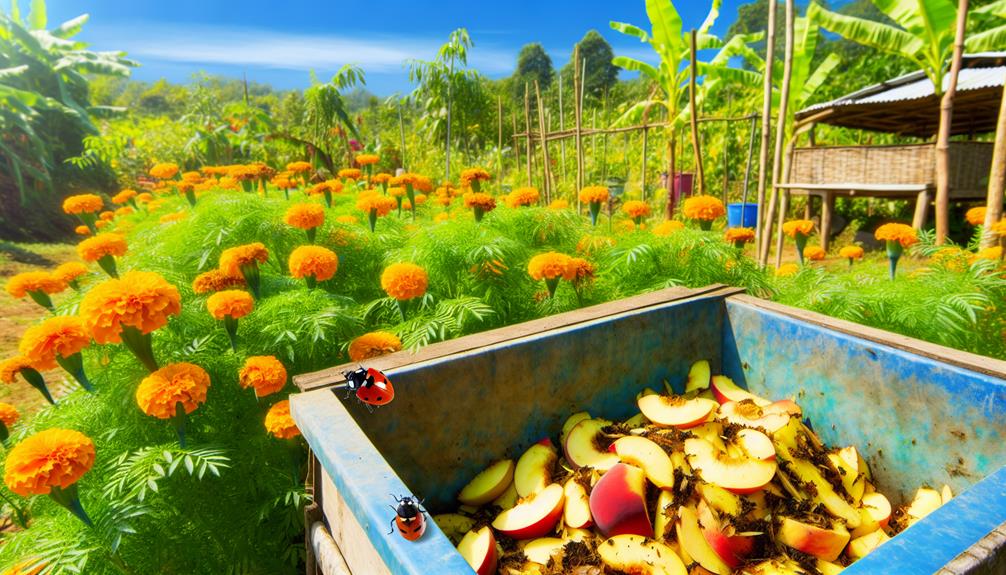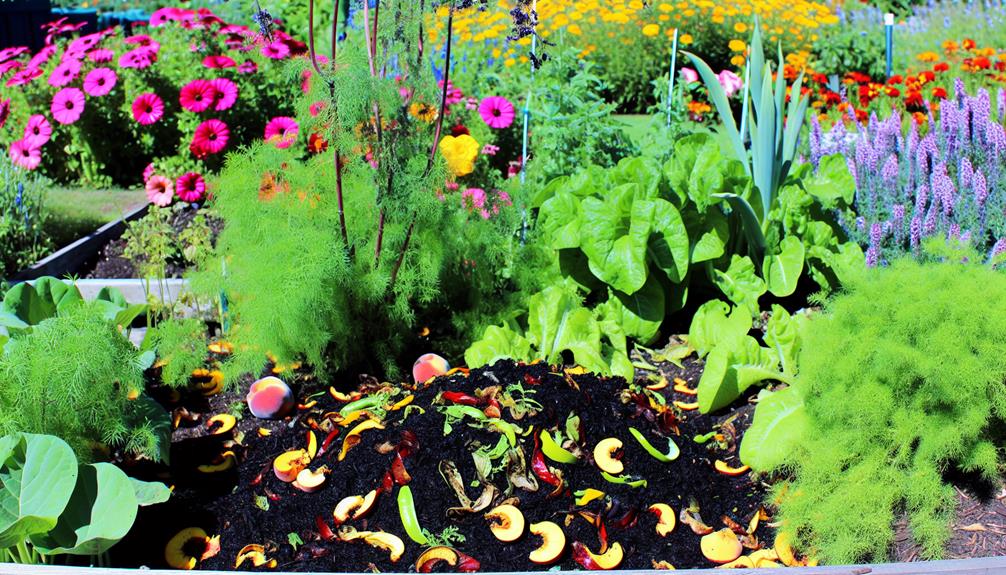

Yes, you can compost peaches. Start by cutting peaches into smaller pieces and removing the pits to speed up decomposition. Peach skins and flesh are nutrient-rich, enhancing your compost pile. Mix the peach pieces thoroughly with other green materials like vegetable peels and coffee grounds to maintain a balanced compost ecosystem.
Be mindful of mold growth and make sure your compost pile has a mix of brown materials such as dried leaves and cardboard. Turning the pile regularly will help with aeration and reduce odors. Following these steps will provide your garden with nutrient-rich compost and reduce waste. Discover more tips on effective composting practices.
Before adding peaches to your compost bin, make sure to cut them into smaller pieces to speed up the decomposition process. Smaller chunks break down quicker, ensuring that your compost pile stays active and healthy.
Remove the peach pits, as they take much longer to decompose and can impede the composting process. You can set the pits aside for separate disposal or see if they can be used for other purposes.
Peach skins and flesh are rich in nutrients, which will benefit your compost. However, be cautious about mold growth. While a bit of mold is normal and can help in breaking down organic matter, excessive mold can lead to unpleasant odors and attract pests.
To prevent this, mix peach pieces thoroughly with other compost materials to allow for proper aeration.
To effectively compost peaches, you need to balance green and brown materials. Green materials include fruit scraps like peach peels, while brown materials include items like dry leaves or cardboard.
Achieving the right balance helps your compost decompose efficiently and prevents unpleasant odors.
Incorporating green materials like fruit scraps, coffee grounds, and fresh grass clippings into your compost pile guarantees a rich nitrogen supply. These green materials are essential for creating the balanced environment that compost needs to break down effectively.
Start by collecting kitchen scraps, such as vegetable peels, fruit cores, and those peach pits you were wondering about. These items provide essential nutrients and moisture.
Grass clippings are another excellent green material. When you mow your lawn, save those clippings and add them to your compost. They’re rich in nitrogen and help speed up the decomposition process. Just be careful not to add too many at once, as they can compact and create a slimy mess.
Coffee grounds are also a valuable addition to your compost. They’re not only abundant but also provide a good nitrogen boost. Used coffee filters can go in, too, as long as they’re unbleached.
For an effective compost, it’s essential to strike the right balance between green and brown materials. Greens like fruit scraps, grass clippings, and coffee grounds provide the nitrogen necessary for your compost to thrive. Keep adding these green materials regularly to maintain a healthy compost ecosystem.
While green materials like fruit scraps and grass clippings are essential for nitrogen, you also need brown materials like dried leaves and cardboard to provide carbon and maintain balance in your compost. These brown materials guarantee your compost stays aerated and decomposes effectively.
Start with dried leaves, as they’re readily available and rich in carbon. Newspaper shreddings are also excellent; they break down quickly and help absorb excess moisture. Just make sure you’re using non-glossy paper, as glossy prints can contain harmful chemicals.
Cardboard pieces are another valuable addition. Tear them into small pieces to speed up the breakdown process, and avoid any with heavy ink or plastic coatings.
You can also use straw, wood chips, and sawdust as brown materials. All these elements contribute to the necessary carbon component, promoting a healthy composting process.
Finding the right balance between green and brown materials is crucial for creating nutrient-rich compost. Green materials, like peach scraps, provide nitrogen, while brown materials, such as dried leaves, supply carbon. Maintaining a balanced mix of these components optimizes composting dynamics and accelerates nutrient decomposition.
To achieve this balance, aim for a ratio of roughly 2:1 between brown and green materials. This means you should have twice as much brown as green.
Here are some tips to help you sustain this balance:
Also Read: Can You Compost Yogurt?
One common mistake in composting is adding too many citrus peels, which can make the pile too acidic. This imbalance can slow down decomposition time and harm beneficial microbes. To avoid this, use a balanced mix of green and brown materials in your composting bins.
Greens include fruit scraps, coffee grounds, and fresh grass clippings, while browns are things like dry leaves, cardboard, and straw.
Another error to watch out for isn’t turning your compost pile regularly. Aeration is essential for speeding up decomposition and reducing unpleasant smells. Turn your pile every couple of weeks to allow oxygen to circulate.
Overloading your compost with large pieces can also be a problem. Chop or shred materials before adding them to your bin to help break them down faster.
Lastly, avoid adding diseased plants or weeds that have gone to seed. These can survive the composting process and cause problems in your garden later.
Managing pests and odors in your compost pile requires a few strategic steps to maintain a healthy and efficient decomposition process. To keep pests at bay and control unpleasant smells, you need to be proactive and consistent with your composting practices.

Here are some practical tips to help you manage these issues effectively:
To further enhance your composting efforts, let’s explore some effective methods to speed up the composting process.
First, consider using compost accelerators. These are additives that contain a blend of nitrogen, microorganisms, and enzymes designed to kick-start the decomposition process. You can find them at most garden centers or make a DIY version using ingredients like coffee grounds and grass clippings.
Next, focus on moisture management. Compost piles need the right amount of moisture to decompose efficiently. Too dry, and decomposition slows down; too wet, and you risk creating an anaerobic environment. Aim for a consistency similar to a damp sponge. If your pile seems dry, add water gradually while turning the compost. Conversely, if it’s too wet, incorporate dry materials like straw or shredded paper.
Turning your compost regularly is another important step. This introduces oxygen, which is essential for aerobic decomposition. A good rule of thumb is to turn your pile every one to two weeks.
Also Read: Can You Compost Cat Manure?
Using peach compost in your garden can greatly enhance plant growth by providing a nutrient-rich soil additive. It not only improves soil structure but also helps in reducing garden waste.

Spread the compost evenly around your plants and watch them thrive.
Peach compost can transform your garden soil into a nutrient-rich powerhouse, promoting healthier and more vibrant plants. By using peach compost as a soil amendment, you can greatly enhance the nutrient content of your garden soil. This compost enriches the soil with essential nutrients, contributing to a balanced and fertile environment for your plants.
When you incorporate peach compost into your garden, you’re adding:
To use peach compost effectively, mix it well with your existing soil. Aim for a ratio of one part compost to three parts soil. This ensures that your plants receive a steady supply of nutrients without overwhelming them.
Also, it’s a good idea to let the compost mature for a few months before application, making sure it has fully decomposed and is ready to nourish your garden.
Incorporating peach compost into your garden can greatly enhance plant growth by providing a steady stream of nutrients and improving soil health. When peaches undergo fruit decomposition, they break down into a rich, organic matter that benefits your plants in many ways. This compost enriches the soil with essential nutrients like nitrogen, potassium, and phosphorus, which are crucial for robust plant growth.
The compost benefits don’t stop at nutrients. It also improves soil structure, helping it retain moisture and promoting better root development. This means you’ll have healthier, more resilient plants that can withstand various environmental stresses.
Here’s a quick overview of the advantages:
| Advantages of Peach Compost | Benefits for Your Garden |
|---|---|
| Nutrient-Rich | Enhances plant growth |
| Improves Soil Structure | Better root development |
| Retains Moisture | Reduces watering needs |
| Organic Matter | Boosts soil health |
| Eco-Friendly | Sustainable gardening |
By turning peach scraps into compost, you greatly reduce garden waste while enriching the soil. This is a fantastic way to practice sustainable gardening and repurpose waste that would otherwise end up in a landfill. Not only does this reduce your carbon footprint, but it also provides your garden with valuable nutrients.
Here’s how you can effectively use peach compost in your garden:
Also Read: Can You Compost Cardboard Tubes?
If your compost pile isn’t breaking down as expected, there could be several issues to troubleshoot. First, check your compost bin to make sure it’s getting the right balance of green and brown materials. Greens, like peach scraps, provide nitrogen, while browns, like dried leaves, add carbon. You need both for efficient decomposition.
Next, examine the moisture levels. Your compost should be as damp as a wrung-out sponge. Too much water can lead to anaerobic conditions, causing unpleasant odors and slow decomposition. Too little water, and the microorganisms can’t do their job. Adjust by adding water or dry materials accordingly.
Also, consider the size of the items in your compost bin. Smaller pieces break down faster. Chop up larger peach pits and skins to speed up the process.
Aeration is another critical factor. Turn your compost pile regularly to introduce oxygen, which helps the composting microbes thrive. If your pile is too compact, it mightn’t be getting enough air.
Lastly, temperature matters. The internal temperature of your compost should ideally be between 135-160°F. If it’s too cold, the microbial activity slows down. Cover your pile or move it to a sunnier spot if needed.
You can compost peach pits, but they decompose slowly. While they add some nutrient contribution, be cautious of potential pesticide residue. Join fellow composters in ensuring organic practices for a healthier, more sustainable community.
Yes, peaches can attract rodents to compost bins. For effective rodent prevention, make sure to provide good compost aeration and cover peach scraps with other compost materials. You’ll feel more connected to nature and your community garden will thrive.
Peaches typically have a decomposition time of 2-4 weeks in your compost. By employing effective composting methods, you can accelerate the process and guarantee your compost pile remains a welcoming space for all organic material.
Yes, you can compost moldy peaches. It’s a great way to recycle organic waste. Just make sure to mix them well with other composting materials for balance. These composting tips will help create richer compost for your garden.
You don’t need to remove peach skins before composting. The nutrient content in the skins adds value, and the skin benefits your compost pile by breaking down naturally. Embrace the process and enhance your compost together!
Composting peaches is a straightforward process that brings numerous benefits to your garden.
Start by properly preparing the peaches, and always balance your green and brown materials to maintain compost health.
Avoid common mistakes like overloading with one type of material, and manage pests and odors effectively.
Speed up the process by turning your compost regularly.
Once ready, use the nutrient-rich peach compost to enhance your garden’s soil, ensuring thriving plants and a productive garden.
